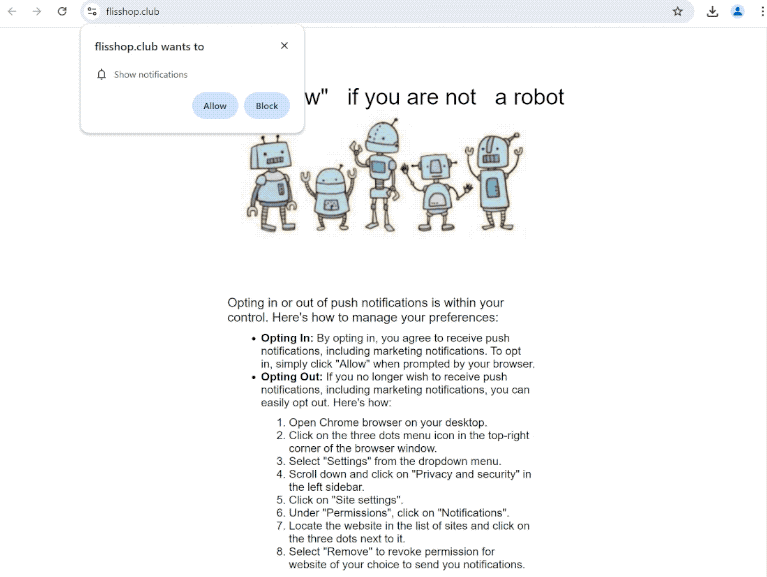flisshop.club is a generic scam website that misuses a legitimate browser feature to spam users’ desktops with ads. When you get redirected to the site, you will immediately get a browser alert saying “flisshop.club wants to show notifications”. If you click “Allow”, you will authorize the site to spam ads.
flisshop.club has no content on it besides an image and a message saying you need to confirm you are not a robot by clicking “Allow” on the “flisshop.club wants to show notifications” browser alert. The “show notifications” feature is completely legitimate but it is usually misused by dubious sites like flisshop.club. If you permit flisshop.club to show notifications, it will spam ads on the right side of the screen instead of showing useful content. The ads will appear similarly to where legitimate system notifications are displayed, which may confuse some users and trick them into interacting with them. Don’t click on those notifications to avoid being taken to questionable or even malicious websites that conceal malware or promote scams.
If flisshop.club has permission to show notifications, you should revoke it as soon as possible. We have provided instructions for how to do it at the end of the report. Until you do, be careful about what you click on.
Why are you redirected to sites like flisshop.club?
If users get redirected to sites like flisshop.club, it’s usually because they browse high-risk websites without an adblocker. A lot of sites, especially ones with pirated or pornographic content, try to expose users to as much advertisement content as possible. That includes spamming ads and triggering redirects. Unless users have an adblocker program installed, clicking on anything when browsing such sites will trigger a redirect. Fortunately, these redirects can easily be blocked with any decent adblocker program.
Redirects to flisshop.club could also be a symptom of an adware infection. Adware, browser hijackers, and similar infections are usually installed accidentally by users via a method known as software bundling. Said infections come added to popular free programs as additional offers, which are set to be installed alongside the programs they’re attached to automatically. Users’ explicit permission is not required.
To stop the added offers from installing, you have to manually deselect them during program installation. The offers are always optional but they are hidden in settings users don’t usually use, which makes software bundling quite deceptive. However, as long as you pay attention when installing free programs, you should have no trouble preventing unwanted installations. When installing a program, choose Advanced (Custom) settings instead of Default (Basic). The installation window recommends using Default settings but Default settings conceal all added offers and allow them to be installed automatically.
Advanced or Custom settings will display all offers that have been added to the program you are installing. Those settings will also give you the option to deselect the offers you do not want. While some offers may initially appear useful, it’s not a good idea to allow their installations because you will quickly fill your computer with junk. Legitimate programs do not use software bundling to install and it’s considered to be a controversial installation method. Programs that do are often detected as potential threats by anti-virus programs.
How do I stop flisshop.club notifications?
In case adware is why you’re getting redirected, it’s a good idea to scan your computer with an anti-virus program. Adware is a persistent infection and can be annoying to remove manually so using an anti-virus program is recommended. You also need a good adblocker program to block redirects and other advertisement content.
If flisshop.club has permission to show you notifications, you can easily revoke it in your browser’s settings. If you need help with navigating the settings, use the instructions provided below. If you don’t want to get notification requests in the future, you can also turn off the notification requests altogether.
If you have given the site permission to show notifications, here’s how to revoke it:
- Mozilla Firefox: Open the menu (the three bars at the top-right corner), click Options, then Privacy & Security. Scroll down to Permissions, press Settings next to Notifications, and remove flisshop.club and any other questionable websites from the list. It’s possible to permanently turn off push notification requests by checking the “Block new requests asking to allow notifications” box in the same Notifications settings.
- Google Chrome: Open the menu (the three dots top-right corner), then Settings, then Privacy and security, then Site Settings. Click on Notifications under Permissions, and remove flisshop.club and any other questionable websites from the list. It’s possible to permanently turn off push notification requests by toggling off “Sites can ask to send notifications”.
- Microsoft Edge: Open the menu (the three dots top-right corner), then Settings, then Cookies and site permissions, then Notifications. Review which sites have permission and remove flisshop.club and any other questionable websites from the list. It’s possible to permanently turn off push notification requests by toggling off “Ask before sending”.
Site Disclaimer
2-remove-virus.com is not sponsored, owned, affiliated, or linked to malware developers or distributors that are referenced in this article. The article does not promote or endorse any type of malware. We aim at providing useful information that will help computer users to detect and eliminate the unwanted malicious programs from their computers. This can be done manually by following the instructions presented in the article or automatically by implementing the suggested anti-malware tools.
The article is only meant to be used for educational purposes. If you follow the instructions given in the article, you agree to be contracted by the disclaimer. We do not guarantee that the artcile will present you with a solution that removes the malign threats completely. Malware changes constantly, which is why, in some cases, it may be difficult to clean the computer fully by using only the manual removal instructions.
